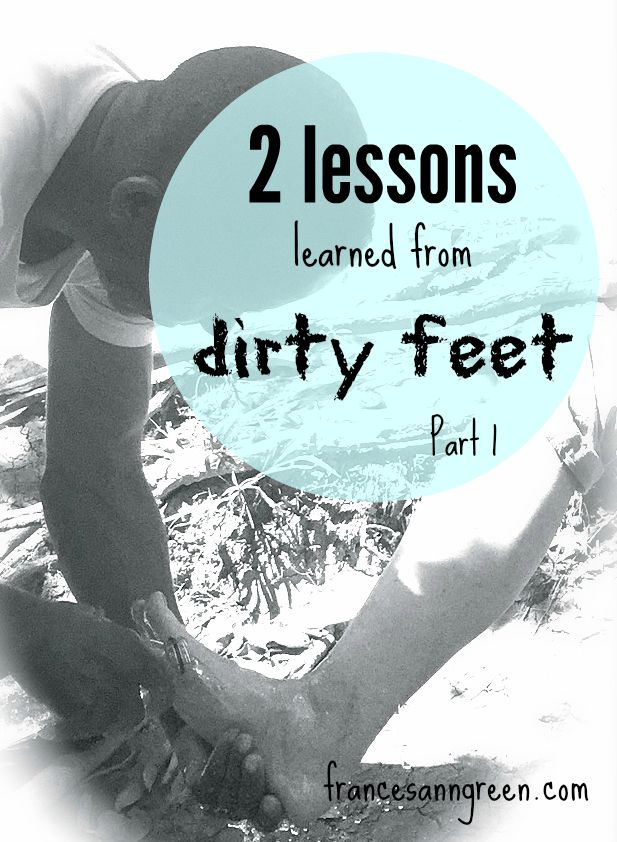Last week I told you about Miguel washing my feet while I sat at the riverside in the Dominican Republic (you can read the full story here). My dirty feet took me down a path to see my heart in the story of Jesus washing his disciple’s feet, which also helped me see my response to Jesus on the cross.  I hope that you got your feet dirty last week and reflected on your own response to Jesus with a towel.
I hope that you got your feet dirty last week and reflected on your own response to Jesus with a towel.
Today I’ll share my second response to Miguel that helped me understand my response to Jesus. Maybe you can relate to what I felt.
After I quit resisting and allowed Miguel to wash my feet, I began to wonder how much cash I had in my back pocket. Did I have enough to tip him well at the end of the day? How many pesos should I add to his day’s wages?
I felt indebted. At the end of the day, though, I would make things even. He washed my feet. I would pay him back.
There’s nothing wrong with paying people for services. We do it all the time and it’s often the responsible response. Last month I paid the repairman for fixing my washing machine, and last week we paid the mechanic for repairing the truck.
But sometimes there’s no room for indebtedness. Someone serves us with no intention of payback. We simply can’t “make things even”. If we try, it harms the relationship rather than helps. If we keep trying, we live enslaved to our indebtedness rather than in relationship with others. Indebtedness becomes a prideful response rather than the responsible response.
When Miguel washed my dirty feet, he helped me see my tendency to feel indebted rather than grateful. Miguel helped me see that if Jesus washed my feet, I’d probably be thinking about how I could make it up to him. I’ll wash other people’s feet to make things even. I’ll serve others to “pay him back” for serving me.
But there are occasions when “Thank you” is enough. Gratitude is better than indebtedness. Meeting Jesus in the story of dirty feet–or the story of the cross–is one of those occasions.
 My Christian walk may look the same on the outside whether my response to Jesus is one of gratitude or indebtedness. It’s a subtle difference that you probably wouldn’t notice with a glance at my life. It’s an inside difference. It stirs below the surface and serves as the motivation for who I am and what I do. Maybe I’d do the same things, but the reason I do them is different.
My Christian walk may look the same on the outside whether my response to Jesus is one of gratitude or indebtedness. It’s a subtle difference that you probably wouldn’t notice with a glance at my life. It’s an inside difference. It stirs below the surface and serves as the motivation for who I am and what I do. Maybe I’d do the same things, but the reason I do them is different.
Although it may look the same on the outside, it feels different on the inside. Gratitude gives freedom, indebtedness enslaves. Gratitude brings peace; indebtedness burdens with anxiety. Gratitude gives joy, indebtedness robs joy.
What about you? Do you think you respond to Jesus with gratitude or indebtedness?
You may be stuck in indebtedness, trying to “make things even” with Jesus if you feel like…
- your perfect attendance on the pew is more about paying off the debt with the foot washer instead of getting to know the foot washer.
- you can never can do enough.
- you can never be good enough.
- you need to “wash more feet” to pay him back for “washing your feet”.
My dirty feet helped me realize that I want to respond to Jesus with gratitude, not indebtedness.  The cross was about canceling debts, not burdening us with debt. I want to live in the freedom from a grateful heart rather than in bondage from an indebted heart.
The cross was about canceling debts, not burdening us with debt. I want to live in the freedom from a grateful heart rather than in bondage from an indebted heart.
At the end of my excursion to the waterfall, I paid Miguel for being my guide, and I gave him an extra tip for being a good guide who even washed my feet. I made things “even” as best as I could.
But with Jesus, I’m just going to be grateful.
How about joining me? If you’ve been carrying around the burden of indebtedness, let it go. Choose gratitude to the one on the floor who washes dirty feet and takes our place on the cross.
Because sometimes, “Thanks!” is enough.






There is such a thing as “good debt”. When you coming out with your book, Travels brought home.
That’s true. I’m hoping our mortgage on the house turns out to be a “good debt”. 🙂 But we don’t have a relationship with the mortgage company. When it comes to my relationship with God, I rather think of it as a parent/child relationship. We’ve done enough for our kids through the years that they could feel indebted, but I would never want that to define our relationship or for them to feel like they have to “pay us back” (although I’m ok if they try every once in a while). 🙂 I do desire to be in relationship with them though, I want us to share our love for each other.
Thanks, Charles.